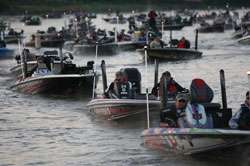
RICHMOND, Va. – Elite Series pro Fred Roumbanis was only half-joking when he suggested his ideal game plan for Day Two of this week’s Bassmaster Northern Open on Virginia’s James River:
“The way to do it would be to run all the way down the river, fish for an hour, then run all the way back up, fish for an hour, then run all the way back down again,” he said. The result would be a $250 fuel bill. Perhaps more significantly, it would leave less than half the day for actual casting and retrieving, but that might not be an inefficient use of time – on tidal waters it’s often not so much a matter of how many casts you make in a given place, but rather when you make them.
Roumbanis, currently in 17th place with 12 pounds 6 ounces, needs to make up nearly 5 pounds on leader Jim Dillard if he’s going to punch his ticket to the Bassmaster Classic this week. While the deficit may seem large, he has one thing that Dillard does not: substantial tidal water experience. Growing up in northern California, he joined the legions of “Delta Rats” who learned to play the moon-influenced swings of the water levels to their advantage. The James is quite similar, he said. “They act exactly the same way here, which makes them so easy to pattern. When the tide is bottomed out it puts them on isolated cover.”
Dillard’s tidewater memory bank is a shorter book. He’s been to the Potomac twice and this is his second trip to the James. It appears he’s a quick learner, having taken his substantial experience on non-tidal rivers like the Ouachita and the Red and connected the dots.
“I’m trying to focus on water levels,” he said. “Once you learn where you can get a bite in practice on a particular water level in practice, you just go back there on the same tide. I’ve caught them on what is historically considered to be the best tide, the last hour or two of outgoing and the first hour of incoming, but I’ve also caught them on high and incoming tides, which are not supposed to be as good, from what I understand.”
He added that while higher tidal stages are typically considered tougher, he believes that’s not because the fish don’t want to eat, but rather because they’re more difficult to access with additional flooded cover. “If you can get a bait to them, they bite,” he explained.
Roumbanis agreed with that assessment. “When you have a bad tide, you either go right up to the bank or go offshore,” he said. “Yesterday I caught my biggest fish on high tide way up in a tiny little gut,” he said. “If you’re not going to get as many bites (at a particular tide) you might as well fish for big fish.”
While 2012 Bassmaster Classic qualifier Andrew Upshaw (7th, 14-12) has limited experience on tidal rivers, he’ll try to maximize his time on the “good” tide again today.
“Everybody who is making the long run to the Chickahominy River has a bad tide most of the day,” he said. “I chose not to go there for that reason. I’m not going very far.” He’ll get an extra hour of outgoing tide to start the morning today and hopes that will allow him to make up some of the gap between his first day bag and those of the leaders while several of the anglers ahead of him are still taking a long boat ride.
Like Roumbanis, Kevin Hawk (2nd, 15-14) was raised in California before moving eastward to pursue a career as a national touring pro, and he too has substantial experience on the California Delta. “Tides aren’t foreign to me,” he said, before noting that this week that tidal experience hasn’t come into play much, if at all. He’s camped out on a 25 yard stretch of water, “a point that comes out on the main river and creates a current break where it drops from 2 to 15 feet.” While the fish “definitely bite better when the water’s moving,” he’s committed to remaining there all day. That presumes he can get on it at all. With a later boat number today, he worried that one of the many competitors who saw him fishing there yesterday as they ran to or from the Chickahominy will decide to claim it as their own. If that happens then Hawk, like the tide, will keep on moving. He might not burn $250 worth of fuel, as in the Roumbanis plan, but his 1 pound 3 ounce deficit to Dillard is just a matter of getting the right bite in the right place at the right time.

